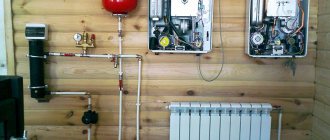The development of technology has led to the replacement of classic wood stoves with boiler units. In addition to firewood and coal, gas, oil, diesel fuel and even electricity began to be used as fuel. Recently, energy for autonomous heating systems has been additionally obtained using solar panels and geothermal installations. Considering that hydrogen is an inexhaustible source of energy, you can try to assemble a hydrogen generator with your own hands to produce environmentally friendly fuel.
DIY hydrogen generator
How the device works
A hydrogen generator for heating is considered a promising development, since fuel with a high calorific value can be obtained from ordinary water. The main task is to obtain pure hydrogen in the simplest and cheapest way possible.
Hydrogen production
Traditionally, the electrolysis method is used for these purposes. Its essence is as follows: metal plates are placed in water, not far from each other, which are connected to a high voltage source. Water conducts electricity, so when electricity is applied, the water molecule breaks into its components. The release of two hydrogen atoms and one oxygen atom from each molecule allows one to obtain the so-called Brown gas with the formula HHO.
The calorific value of Brown's gas is 121 MJ/kg. When the substance burns, no harmful substances are formed, and in order to use it as an energy carrier for heating a house, it is enough to slightly upgrade a standard gas boiler. However, when creating an installation for producing hydrogen with your own hands, special attention should be paid to safety measures - when hydrogen combines with oxygen, an explosive mixture is formed.
Generator design
An electrolyser, an installation for producing Brown gas by electrolyzing large volumes of water, consists of several cells in which metal plate electrodes are mounted. The larger the total surface area of the electrodes, the more powerful the installation.
The cells are located in a sealed container, which is equipped with a pipe for connecting to a water source, a pipe for removing the resulting gas, and terminals for connecting the power supply. The generator is also equipped with a water seal that prevents contact of hydrogen with oxygen, and a safety valve to prevent the backfire effect - the gas burns only in the burner device.
Operating principle of a hydrogen generator
Recommendations for operating a hydrogen boiler
- It is strictly prohibited to independently upgrade such equipment, even if you have a detailed and professional engineering drawing. This may contribute to the possibility of leakage of the hydrogen mixture from the generator into the open space, which is quite dangerous.
- It is recommended to install special temperature sensors inside the heat exchanger, this will make it possible to monitor the likely excess of the water heating temperature level.
- The burner design itself can include shut-off valves, which will be connected directly to the temperature sensor itself. It is also necessary to ensure normal cooling of the boiler.
- And finally, what needs to be emphasized is safety. It must be remembered that the mixture of hydrogen and oxygen was not called explosive for nothing. NHO is a dangerous chemical compound that can cause an explosion if handled carelessly. Follow safety rules and be extremely careful when experimenting with hydrogen.
If handled correctly, a hydrogen boiler can last not 15 years, as is usually expected, but 20 or even 30. However, remember that the greater the power of the boiler, the greater the electricity consumption!
Hydrogen heating
Hydrogen heating of a house requires the use of an installation with a large area of electrodes, otherwise the heating boiler will not be able to effectively heat the coolant. It is unprofitable to use a conventional electrolyzer, increasing its dimensions, since more electricity will be spent on producing hydrogen than would be spent on operating an electric heating boiler to heat a house of the same area.
Development of more efficient installations for producing hydrogen fuel without unnecessary energy consumption is underway. The story of the American inventor Stanley Meyer is known, who created a “hydrogen cell” that consumes tens of times less electricity compared to traditional installations. However, the scientist failed to make a revolution in modern technology - he died suddenly from poisoning, and the drawings of the installation disappeared.
The creation of a hydrogen generator with attempts to implement Meyer’s idea is being worked on in technical laboratories and in the workshops of home craftsmen all over the world. The invention of the American scientist was to create a resonance of a swaying water molecule with electrical impulses - in this case, it splits into atoms without the use of high electrical voltage.
Bright prospects
Hydrogen is an extremely promising energy carrier for a number of reasons.
:
- It is available throughout the Universe, on Earth it ranks tenth in terms of prevalence - the energy resource can be called inexhaustible.
- The gas is non-toxic and cannot harm living organisms. It is only important to take safety measures to prevent leakage with the formation of an “explosive mixture” of hydrogen and oxygen.
- The product of hydrogen combustion is ordinary water vapor.
- The energy carrier has a high heat capacity, the combustion temperature is 3000°C.
- If gas leaks, it will quickly evaporate without causing any harm, since it is 14 times lighter than air. But there should be no open fire or sparking wiring nearby, otherwise the explosive mixture will explode.
- A cubic meter of hydrogen has a calorific value of 13,000 J.
Advantages of hydrogen heating
Hydrogen as an energy carrier - scope of application
Hydrogen is highly regarded as an energy carrier and is actively used, for example, as fuel for space rockets. Various methods are used to obtain it on an industrial scale. This is mainly the gasification of coal or petroleum products, the conversion of methane and its homologues. Such cheap hydrogen cannot be considered as an environmentally friendly fuel, since its production is associated with harmful emissions into the atmosphere. Electrolysis of water to produce hydrogen in large volumes is used only in Norway, where there is an abundance of cheap electricity.
The compact electric gas generator has found application in the field of gas cutting. Equipment producing hydrogen is more convenient to use compared to bottled gas - there is no need to transport heavy cylinders, depend on liquefied gas supplies, etc. But for the sake of convenience, savings were brought - the electrolytic process requires a lot of electricity, as a result, the cost of the energy carrier increases significantly. At the same time, the difference in the cost of purchased and produced hydrogen is largely compensated by the absence of costs for its delivery.
Hydrogen heating boilers
On many websites devoted to heating systems, you can find information that hydrogen is a worthy competitor to natural gas as an energy carrier for a heating boiler. The emphasis is on the fact that by installing a hydrogen generator, you get the opportunity to spend no more money on heating than on gas heating, without having to fill out a lot of documents and pay significant sums for connecting your house to the central gas network.
Based on the above, the article can conclude that the cost of hydrogen is low only during its industrial production. That is, producing fuel by electrolysis will obviously cost more, and it makes no sense to rely on attractive figures for the cost of a kilogram of liquefied hydrogen.
Let's take a look at the boiler equipment on the market. The production of hydrogen boilers is carried out by the Italian company Giacomini, which specializes in the field of alternative energy. Also, similar units are manufactured by some Chinese companies that have successfully copied the technology.
Hydrogen solid fuel boiler
Giacomini's developments are aimed at creating heating equipment that is completely safe for the environment.
The hydrogen boiler of this company belongs to this category - its operation is associated with the release of water vapor, there are no harmful emissions. Hydrogen is used as an energy carrier, and it is produced by electrolysis.
However, it is worth paying special attention to the operating principle of this boiler. The hydrogen produced in the system is not burned; it reacts with oxygen in the presence of a catalyst. As a result, thermal energy is released, which is sufficient to heat the heating circuit to 40°C.
That is, hydrogen boilers, which can be purchased at a reasonable price, are only suitable for use as a heat generator for a water floor circuit, baseboard or ceiling heating.
It can be concluded that the world's manufacturers of boiler equipment have not found an acceptable technical solution to create an efficient heating boiler capable of using the thermal energy of burned hydrogen. Or they calculated that this option is unprofitable.
Pros and cons of heating
Among the advantages that allow using this type of heating in everyday life are the following indicators:
- Absolutely environmentally friendly - water breakdown products (hydrogen, oxygen and steam) do not affect health even during combustion.
- The maximum efficiency level, reaching 96%, is much higher than the same coal, diesel or natural gas.
- The use of hydrogen as an alternative source of energy resources can significantly save reserves of exhaustible natural resources, reducing their production several times.
- Low cost - for heating residential buildings, the cost of the system is insignificant, and the simplicity of operation, based on the primitive chemical reaction of electrolysis, allows you to assemble the system yourself.
Among the shortcomings, only three indicators can be identified:
- The need to replace the metal plates annually is necessary to ensure that electrolysis occurs with the highest possible level of hydrogen production.
- Expensive equipment - purchasing a factory installation will cost an average of about 35-40 thousand rubles.
Making a generator in-house
On the Internet you can find many instructions on how to make a hydrogen generator. It should be noted that it is quite possible to assemble such an installation for your home yourself - the design is quite simple.
DIY hydrogen generator components for heating in a private home
But what will you do with the resulting hydrogen? Once again, pay attention to the combustion temperature of this fuel in the air. It is 2800-3000°C. If you consider that metals and other solid materials are cut with the help of burning hydrogen, it becomes clear that installing the burner in a regular gas, liquid fuel or solid fuel boiler with a water jacket will not work - it will simply burn out.
Craftsmen on the forums advise lining the inside of the firebox with fireclay bricks. But the melting point of even the best materials of this type does not exceed 1600°C; such a firebox will not last long. The second option is to use a special burner that can reduce the flame temperature to acceptable values. Thus, until you find such a burner, you should not start installing a homemade hydrogen generator.
Tips for assembling and operating a generator
Having solved the issue with the boiler, choose a suitable diagram and instructions on how to make a hydrogen generator for heating a private house.
A homemade device will be effective only if
:
- sufficient surface area of the plate electrodes;
- correct choice of material for the manufacture of electrodes;
- high quality liquid for electrolysis.
What size should be the unit that generates hydrogen in sufficient quantities to heat a house will have to be determined “by eye” (based on other people’s experience), or by first assembling a small installation. The second option is more practical - it will allow you to understand whether it is worth spending money and time on installing a full-fledged generator.
Rare metals are ideally used as electrodes, but this is too expensive for a home unit. It is recommended to choose stainless steel plates, preferably ferromagnetic.
Hydrogen generator design
There are certain requirements for water quality. It should not contain mechanical impurities and heavy metals. The generator operates most efficiently on distilled water, but to reduce the cost of design, you can limit yourself to filters to purify water from unnecessary impurities. To make the electrical reaction more intense, sodium hydroxide is added to the water in a ratio of 1 tablespoon per 10 liters of water.
Economic question
Before you begin to understand in detail how to make a hydrogen generator, it is advisable to remember your school physics course. All transformations occur with a loss of energy, that is, the cost of electricity to produce hydrogen will not be recouped by the thermal power when burning the resulting fuel.
If we consider that it is simply impossible to burn hydrogen at maximum temperature and heat transfer at home, it becomes clear that real losses will be even higher than those calculated for ideal conditions.
So, using a DIY hydrogen generator for heating doesn't make any sense if you don't have access to free electricity. Installing an electric boiler to heat your home and spending electricity directly, without complex transformations, will cost you 2-3 times less. In addition, the electric boiler is completely safe, and the operation of a homemade installation can lead to an explosion if the installation and operation rules are not followed.
Obviously, producing cheap hydrogen in an environmentally friendly way, which includes electrolysis, is a matter of the future, which scientists in the leading countries of the world are working on today.
What is hydrogen and how is it used
Hydrogen has been known to people for many centuries. During the Middle Ages, a large number of experiments were carried out, and during one of them, hydrogen was noticed: when sulfuric acid came into contact with metal, air bubbles were released. Hydrogen is a light, colorless gas with no characteristic odor. When combined with oxygen, it can form an explosive mixture. It has the ability to dissolve in ethanol, iron, platinum, palladium and nickel. In addition, hydrogen is completely non-toxic.
The process of producing hydrogen is carried out using electricity and water: using the electrolysis method, it is possible to split water into hydrogen and oxygen, which makes it possible to use these substances for your own purposes. According to statistics, hydrogen is the most abundant substance in the world.
It can be found in almost any natural resource.
Hydrogen has some properties that distinguish it very much from its counterparts: in liquid form it is the lightest liquid, and when solidified it is the lightest substance. All this is due to the very small dimensions of hydrogen atoms. Hydrogen is actively used in the production of various substances and materials, for example, to produce ammonia or liquid fats. The value of hydrogen for the food industry is also determined by its unique characteristics.
This element is also used in technology: for example, an oxygen-hydrogen burner allows you to create a temperature above two thousand degrees, which allows you to melt quartz. You can use hydrogen even at home: hydrogen peroxide is stored in almost every home medicine cabinet. Special cylinders are used to store fuels such as hydrogen.











